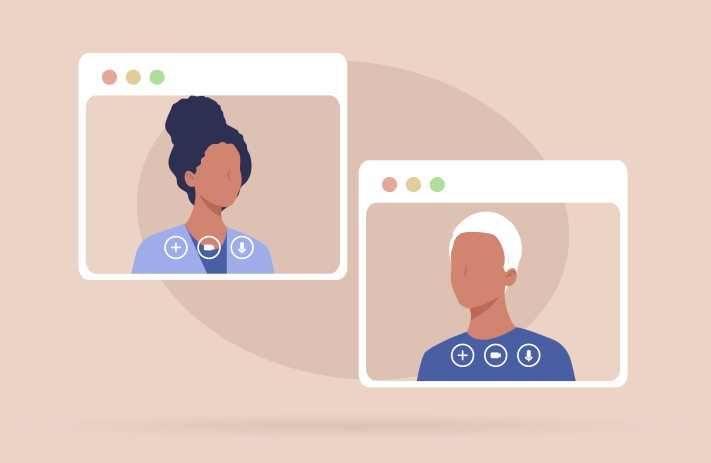
Click the button to start reading
7 Tips for Conducting A Great Remote Interview
Remote interviews are all the rage these days, and while they’re really convenient, it can definitely be a challenge to conduct an interview when you can’t meet face-to-face.
Fortunately, there are strategies to help you be successful, and in this remote interview guide, we’re going to break them down for you, so keep reading to learn the pros and cons of remote interviewing and our 7 top tips on how to conduct a remote interview.
But first, let’s make sure we’re all on the same page by clarifying what a remote interview actually is …

What Is a Remote Interview?
A remote interview is one that occurs over the phone or more often these days, via video. Typically, a remote interview is set up when two people can’t meet face-to-face due to geographic distance or as we saw more recently, a pandemic.
Although these virtual interviews are conducted in a similar fashion to traditional face-to-face interviews, they do require some special considerations, since it’s difficult to read body language over video.
The Pros and Cons of Conducting Remote Interviews
For many hiring managers, remote interviews are well worth it, because they have several advantages …
The Pros of Remote Interviewing
-
Less Stress – Interviewing is stressful, and it’s made even more so when you have to put on a suit, fight traffic, navigate directions, and search for parking. By contrast, when interviewing remotely, interviewees have the opportunity to respond to questions in the privacy and comfort of their own homes.
As a result, they feel more at ease, and subsequently, can put their best foot forward … which isn’t just good for the interviewee, it’s also good for the interviewer.
Because candidates tend to be less nervous when interviewing remotely, an interviewer can get a better gauge of their expertise and abilities, rather than become distracted by their presentation skills–which may not even be relevant to the job they’re interviewing for.
-
Lower Costs – It’s expensive to interview remote candidates in person. You have to fly them in, put them up in a hotel, and pay for their expenses – essentially, making a large financial investment before you’re even certain you want to hire them.
By contrast, video lets you screen candidates with minimal financial investment. At most, you only need to pay for the video conferencing software you’re using, making it far more cost-effective than an in-person interview.
-
Wider Talent Pool – Not every company is willing to fly candidates in for interviews. Likewise, many candidates don’t want to travel to an interview on their own dime, even if they plan to move to the city in question. For a lot of candidates, it’s just too big of a financial risk when there’s no guarantee they’ll actually be hired.
Fortunately, virtual interviews eliminate geographic limitations from the hiring process, giving employers a wider pool of applicants to choose from. As a result, they can select the best candidate for the job — rather than an average one that’s geographically desirable.
-
Greater Flexibility – When you bring someone in to interview, the plan might be to have them talk to four people back-to-back–so they can meet all the key players in one day and don’t have to return for a second interview.
Although this makes good sense, it’s a scheduling nightmare since ideally, you’ll want to find a block of time that those four interviewers are free back-to-back, so the job candidate doesn’t endure long waits between interviews.
Remote interviewing eliminates the need to schedule back-to-back interviews. Not only does this make the interviews easier to schedule, but it also gives the interviewee a break, so they can run to the restroom or grab a snack between meetings.

-
Faster Hiring – Virtual interviewing can cut down on the length of time it takes to fill a position. There are a couple different reasons for this. For one thing, you don’t have to look for a 4-6 hour window where all the various parties are free to schedule multiple interviews.
Even if it’s just one interviewer, it’s all too common for interviews to be pushed off until later, because the interviewer can’t find the time to fit them in. However, virtual interviews can be scheduled flexibly–in the evening, on weekends, or at virtually any time of day. Because they’re easier to schedule, the process of hiring someone is shortened.
-
Better Recall – When you’re conducting a dozen interviews over the course of a week, it can be difficult to remember what each candidate said. Fortunately, video to the rescue!
Because you can record video interviews, you can easily return to them for review whenever you want … which definitely comes in handy when you’re trying to reach a final decision about who to hire.

The Cons of Remote Interviewing
-
Body Language – A lot of interviewers rely on body language to help them decide whether a candidate is a good fit. Unfortunately, while it isn’t impossible to discern body language over video, it can be more difficult — especially if you don’t have a great connection.
-
Bad Connection – As we mentioned in the last bullet point, remote interviews aren’t risk-free, because there’s always the possibility of a bad internet connection.
People working in remote locations or overseas, for instance, might experience slow speeds or buffering problems that can make a remote interview frustrating at best and impossible at worst.
-
Additional Staff Training – While IT managers may be comfortable conducting remote interviews, non-techies who are suddenly tasked with virtual interviewing may feel intimidated by video conferencing technology.
While this hesitation can be overcome with training, companies still need to provide that training to ensure that the entire hiring team is comfortable with video conferencing technology.

7 Remote Interview Tips
Interviewing candidates remotely? Have no fear! In this section, we’ll share our tips on how to interview remotely, so you can proceed with confidence.
Tip #1 – Test Your Tech
It can be incredibly frustrating for job candidates to go to the trouble of preparing for an interview … only to find out that the interviewer didn’t put forth the same effort.
So, in advance of your interview, make sure you know how to use your video conferencing software, and check to see if your mike and camera work. You’ll also want to confirm that your software allows you to record the video, so you don’t have to bother with note-taking while you’re assessing a candidate.
And if other members of your team will be participating in the interview, it’s a good idea to verify that you have the correct permissions to add them to the call.
Tip #2 – Set Expectations
You want recruits to know what they can expect from the call, so they’re every bit as prepared as you are … which is why prior to the interview, you’ll want to explain who they’ll be meeting with and how long the interview will take, so they can block off enough time on their calendar.
If you want to go the extra mile, it’s also helpful to give candidates some tips on how they can prepare for the remote interview, such as using good lighting, doing their own mike testing, or troubleshooting Zoom.
This helps ensure that both parties are prepared for video’s technical challenges, so the interview goes off without a hitch.

Tip #3 – Avoid Overbooking
Although you can book back-to-back interviews with a dozen candidates, we don’t recommend it. Instead, give yourself time between interviews to get up, stretch your legs, go to the bathroom, or grab a snack.
These mini-breaks will help you recharge your batteries, so you’re on top your game even when you’re talking to the last candidate of the day. Plus, they’ll also give you time to record your thoughts about a potential hire before moving on to your next interview.
Tip #4 – Eliminate Distractions
Distractions can ruin the flow of an interview and even prevent you from getting the information you need to make a decision. So, before hopping on a video call, eliminate distractions by finding a private area to talk, whether that’s your employer’s conference room or a home office.
It’s also a good idea to get rid of any clutter that could be distracting, for instance by making sure your camera faces a blank wall, rather than your unmade bed.
And of course, you’ll also want to minimize background noise as much as possible, so shut your windows, turn off your phone notifications, and avoid running any loud appliances, like the dishwasher.
Finally, if you have pets, make sure you secure them in another room before the call starts.
Tip #5 – Establish Rapport
A good rapport fosters trust, respect, and empathy–qualities that help job candidates open up because they feel more comfortable. As a result, you can get a better sense of who they are and whether they’d be a good cultural fit at your organization.
While rapport may seem easier to establish with someone face-to-face, there are techniques for building good rapport over video.
For instance, before the call starts, take a few deep breaks, so you can get centered. Then, once the interview begins, warmly greet the candidate by thanking them for “coming in,” offering a virtual handshake, or even giving a little wave.
Interestingly enough, research shows that warm greetings like these help form a stronger emotional connection over video than a more neutral welcome, like, “Hey, let’s get started.”
Throughout the call, make good eye contact and nod your head periodically, so your interviewee knows you’re actively listening. If you want to go the extra mile, you can even virtually mirror their words.
For instance, if a prospective candidate says, “I was promoted to district manager at my last job,” you might respond by saying, “You were promoted to district manager?”
Not only does this show interest, but it’s also a great way to get the candidate to offer up more details. Just be careful to use this tactic sparingly, so you don’t overdo it.

Tip #6 – Assess EQ
Emotional intelligence or EQ refers to someone’s ability to understand and manage their emotions. Typically, people with high EQ are self-aware, able to regulate their emotions, empathetic toward others, and have good social skills. These are the people we say know how to read a room.
The reason it’s so important to assess a candidate’s EQ is because research shows that EQ is actually one of the biggest predictors of job success–no matter what type of job you’re hiring for!
So, to get a sense of someone’s EQ, try asking questions that’ll yield revealing answers about someone’s self-awareness, priorities, and emotional responses, like:
- What inspires you?
- What 3 workplace values would you emphasize if you were starting your own company?
- & Tell me about a workplace conflict you had in the past and how you handled it.
These questions can go a long way toward helping you make a great hire.
Tip #7 – Remember You’re Also Being Interviewed
Due to the Big Quit, more and more employers are struggling to find the right hires, and the best candidates will typically have multiple job offers.
So, put your best foot forward during the interview by holding yourself to the same standard you’re gauging potential hires by — meaning you’ll want to dress accordingly, behave professionally, and prepare good questions.
You’ll also want to share appealing information about your company, such as its professional development opportunities or collaborative culture.
The latest research shows that in 2022, employees are looking for employers who prioritize their wellbeing, offer them the flexibility to work from home, and share similar values … so if your company is proud of its accomplishments in these areas, don’t forget to mention that during the interview.
Alright, we’ve reached the end of our tips. Armed with this information, you can go forth with confidence, knowing you’re prepared to conduct a successful remote interview.
Thanks for reading, and if you want more recruitment tips, check out our article, “The Definitive Guide to Hiring Remote Employees (and How to Find Them).”
















